How to Increase Rice Crop More Productive #Part 1
Rice Cultivation
Selecting Rice Varieties, Land preparation, Selecting and making the place nursery, Planting Rice Seeds, care, fertilization, Sprayin, Post-harvest and harvesting.
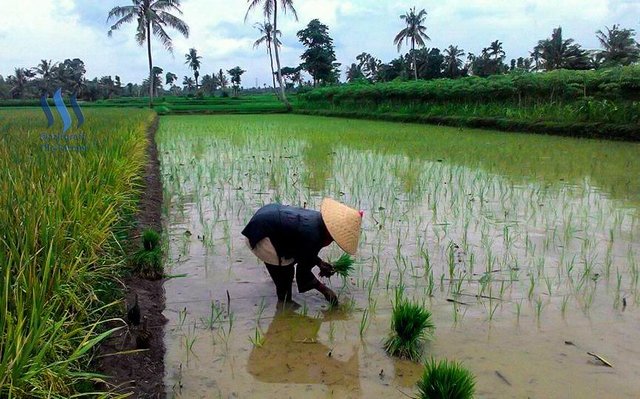
A farmer is farming rice on his own rice field. I took this photo right on the edge of the village road while moving back from Bireuen district, Aceh province. Photo Taken By @azirgraff
Rice is one of species plant to produce rice and one of most important thing in the world. Rice in Latin is called as Oryza sativa. In Indonesia, Rice is one of most vital cultivation plants. Rice thought have originated from India or Indochina and entry Indonesia through an immigration ancestor through mainland Asia around 1500 BC.
Although, rice production in the word got the third rank after corn and wheat, but the rice is the main source of carbohydrate food for most world community.
Before we discuss how to plant rice correctly, I will explain first about economic development of crop productivity.
In Indonesia, the rice occupies in the first place as a staple food in community life. However, the production of national rice today was not able to meet people necessity, in other words Indonesia has not been able to be self-sufficient in rice. As an agricultural country with wide rice fields, rice production should be abundant in Indonesia. Minimum for domestic needs, But the fact was very ironic, until today the rice still importing and the worse is Indonesia is largest rice importer in the world.
The leading country of rice product are Republic of China (28% of the world's total production), India (21%), and Indonesia (9%). However, only a small percentage of world rice production is traded between countries (only 5% -6% of total world production). Thailand is the main exporter of rice (26% of total world traded rice) followed by Vietnam (15%) and the United States (11%). Indonesia is the largest rice importer (14% of the world's traded rice) followed by Bangladesh (4%) and Brazil (3%), Indonesia's rice production in 2006 was 54 million tons, then 2007 was 57 million tons III), missed the original target of 60 million tonnes due to the drought caused by the ENSO (wikipedia) symptom.
There are several stages of rice cultivation, these steps need to get quality rice crops, exactly it require a way of planting rice and planting process is good and correct, what preparations should be considered in cultivating rice crops. Here are some stages of rice planting that must be noticed in order to get a satisfactory harvest.
Selecting Rice Varieties
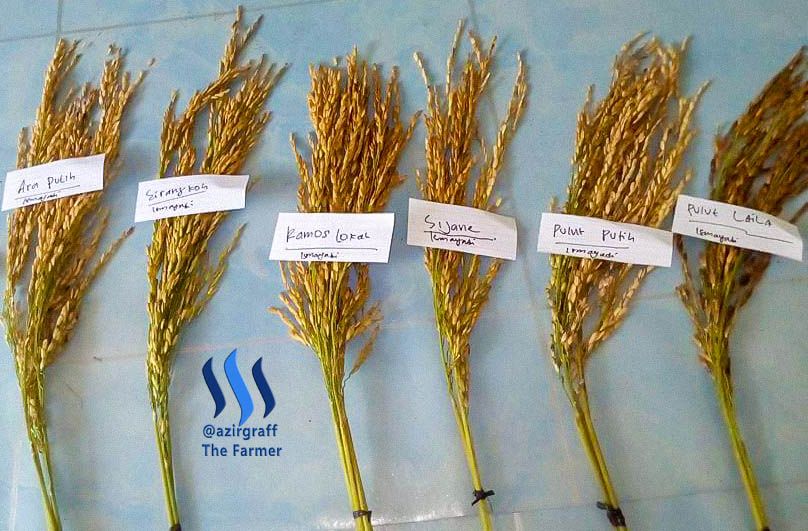
This photo is a superior rice varieties that I photo at a seed research center in Bireuen District, Aceh Province. Photo Taken By @azirgraff
The quality seed is one of most important components to increase farm production and income. Any various of superior rice varieties, local and hybrid rice currently very easy to obtain, but for good rice cultivation should to use superior rice varieties. Why in this paper I suggest using superior seeds? Superior rice varieties can increase yields, resistant to pests and diseases, can adapt to various climates. In addition, superior rice varieties have healthy plants, the seeds will fast growing and uniform, rooting a lot, more stems, strong and high. How to choose the seeds soaked in 20G/liter ZA solution of water, then the seeds that float or removed. Then the seeds that submerged is a good seed to cultivated.
Below is some varieties of rice that are suggested by Food Crops Research Institute of 2016 to be cultivated.
wikipedia.org
Until July 2017, UPBS BB Padi has distributed the seed source of Inpari 42 Agritan GSR and Inpari 43 Agritan GSR each of 1.4 tons and 1.3 tons spread in West Java and Central Java Province.
Currently, Inpari 42 Agritan GSR and Inpari 43 GSR seed stocks are 3.5 tons each and 5.3 tons of source seeds.
Furthermore, IPB 3S seed has a productivity of 8 - 11 tons / ha and is resistant to aphis plant pests. This seed has been planted in Karawang and reaches production of 13.4 tons / ha. In addition, many other types of superior rice varieties that already exist in the market, for farmers who want to cultivate rice plants can look for seeds the table above in the nearest market. Regarding the discussion from me, on other posts I will share about the various types of superior that have been recommended.
In addition, many other types of superior rice varieties that already exist in the market, for farmers who want to cultivate rice plants can look for seeds that excel in the nearest market. Regarding the discussion from me, in other posts I will share about the various types of rice varieties that have been recommended.
Land Preparation
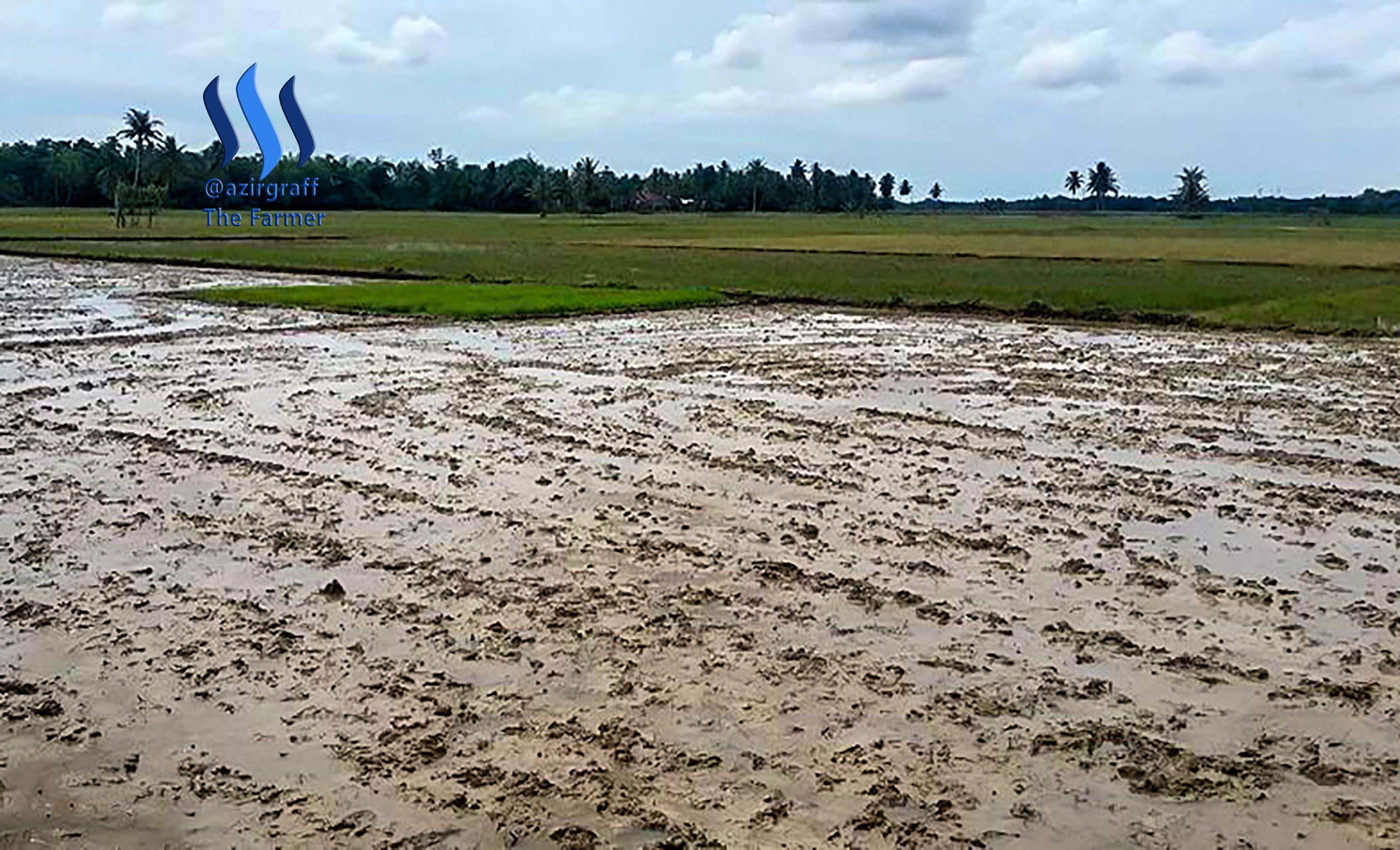
The land that is being prepared for the planting of superior rice varieties, this rice field photo I took in Bireuen district, Aceh province. Photo Taken By @azirgraff
Soil processing aims to change the physical properties of the soil to make hard layers flat and muddy, so that weeds will die decay and become humus so that the growth of rice plants is not disturbed because it must share nutrients, water and weeds. If it was free from wild plants, wet soil with water then hijacking to become ground water better and underground layer becomes saturated water so it can save water.
Piracy was done to prepare the soil in soft and loose condition and suitable for planting. In modern times piracy is no longer done by hoeing, but by using cattle or tractors. After going through hijacking, re-flood the media planted with water. Water was given in large quantities to cover all land with a height up to 10 cm. Let the water on the growing media continues to stagnate. Stagnant water for two weeks will cause the medium plant to become coated and toxins can be lost due to neutralized.
a. Cleaning
The paddy fields are cleared of grass, repaired, and made somewhat tall. The main function of bunds at beginning to hold water during soil tillage is not to flow out the map. The next function is closely related to water regulation of requirements during the existence of rice plants. Channels or ditches are repaired and cleaned from the grass. The activity aims to facilitate the water flow and suppress the number of weed seeds carried into the plot. The remaining straw and crops in the field if cleaned before the soil processed. The straw can be burned or transported to other places for animal feed, compost, or fuel. Cleansing of plant debris can be done by hand and hoe.
b. Embellishment
After repairs and bunds have done, the next stage is embankment. The corners of the plot hoisted to facilitate plow or tractor work. The work carried out simultaneously with time of tillage.
c. Piracy
Piracy and renewal are related activities. Both of these activities aim to make the rice field muddy and ready to be planted with the rice. Soil processing was done by using tractor machine. Before it hijacked, the rice fields were flooded with water for loose. Long flooding of rice fields is affected by soil conditions and plant preparation.
Piracy usually done twice. With this hijacking it expected to clumps of soil split into small pieces. Clumps of soil destroyed with rakes so that it becomes a smooth mud. The profit of treated land is irrigation water can be evenly distributed. In the wide rice fields, it is necessary to make beds. Between one bed with other beds in the form of small channels. The end of the channel meets a small trench at the edge of the bund which useful for facilitating irrigation water.
Selecting the Nursery Place
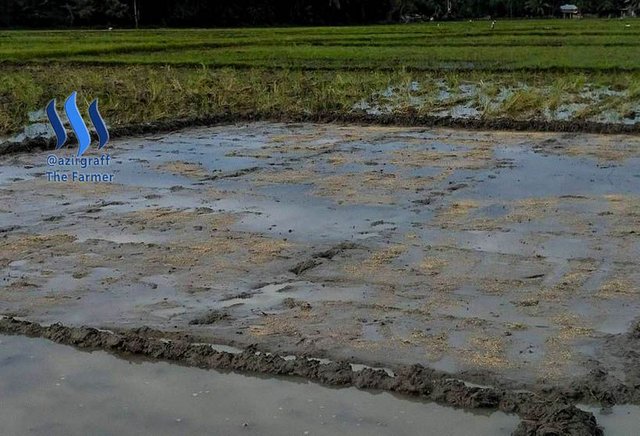 .
.
This photo shows a seedbed of rice seedlings that will be cultivated by a farmer (Ikhsan) in Bireuen District, Aceh Province. Photo Taken By @azirgraff
Place to make a nursery is a condition that must be considered in order to obtain good seeds, the soil should be fertile, open, close to the water source, and if the land is wide, it is better for the two-way bandengan to save costs and facilitate transportation.
Here are some ways to make a milkfish that we must pay attention to:
- The width of the beds is measuring 1.0 -1.2 m and for the length adjusted to the needs in accordance with the land area.
- The area of the seedbed for 1 hectare of land is 400m2 (4% of planted area), and the drainage should be good.
- Add 2kg of organic material such as compost, manure, sawdust and husk that has been decayed / ash.
- Nursery done 25 days before the planting period, nursery done on the same land or adjacent to the paddy fields that will be planted, this is done so that the seeds are ready to move, time is lifted and will be planted easily transported and kept fresh.
- Provide seeds to be planted on an area of 1 ha of 20 kg.
- Soak the seeds to be perfectly sown about 2 x 24 hours in a bucket or other container, this is done so that the seeds germinate.
- Nursery beds are made of 100 m2 / 20 Kg, the land for this nursery had to be processed first, the cultivation of the land for the nursery was done by embracing the soil into mud and the fireplace was done with banana stems.
- Land that has been fine mud is then in the plots and between the plots is made of trenches to facilitate the regulation of water.
- Seeds that have been soaked for 2 x 24 hours and have germinated stocked dipersemaian carefully and evenly, it is intended that the seeds that grow not stacked.
- The seeds do not have to be immersed in the soil because they can cause sprouts infected with pathogens (causes of plant diseases) that can cause spoilage of sprouts.
- Fertilization of nursery land is done approximately at the age of one week after planting seed (sow). The fertilizer requirement used for pesrsemaian with 1 hectare land area is 2.5Kg Urea, 2.5Kg SP36 and 1Kg KCL.
To be Continued.....>
Farmer life !!!
Source
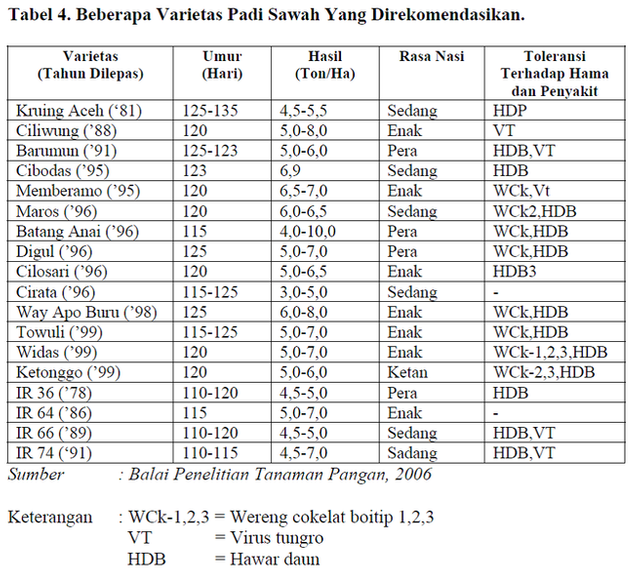
I appreciate your post about life farmer. I'm waiting for next part.
Thanks @elfaisal
i will wait part 2 good luck
One of the benefits of going to the rice fields is to produce rice and can help the poor and needy at harvest time. (zakat) good post @azirgraff
We'll wait next post and hopefully the farmers have already harvested :)
Thanks @kharrazi, This post is unfinished, happy waiting at the next Part
I'll wait here my friend
Good friend @kharrazi, but I'm still in the field for research
wow, I can not wait for the results :)
I have wild rice on the water adjacent to my land. The harvesters use a canoe and bend the rice into the canoe and beat with a wooden stick. The rice falls into the canoe. I would like to know more about what to do with the rice after it comes off the stalk. Thanks for the good information.
Thank @jmarc, when the rice grains appear and fill white fluids like milk. At that moment usually the pests start coming to suck, Then do spraying to avoid pests.
Nice post. @azirgraff
Thanks
The new agricultural sector can be said to be advanced or become the backbone of a country if it can always meet the needs of food for humans and especially farmers can live prosperous. But is the condition of our agriculture right now the backbone of the economy @azirgraff?
Thanks for sharing this great post about rice production. I think that it would benefit us all to learn a bit about the production of a plant that feeds so many people. Are birds a problem for a nursery like this @azirgraff? How do you prevent them from seeing/eating the seeds?